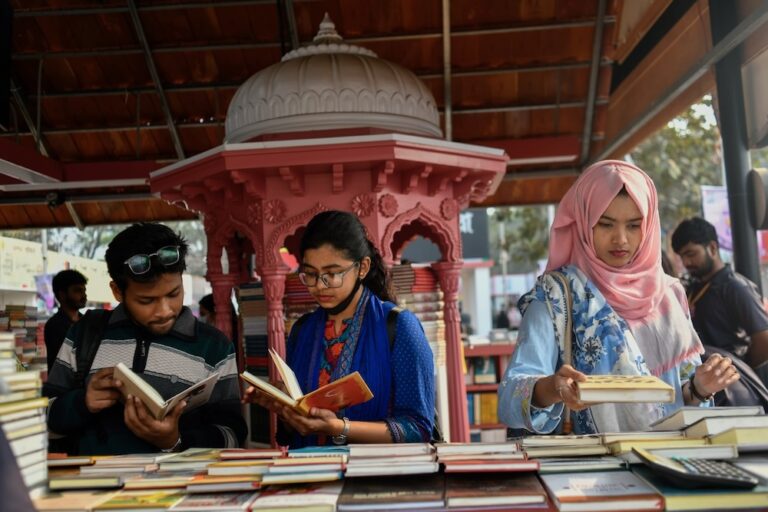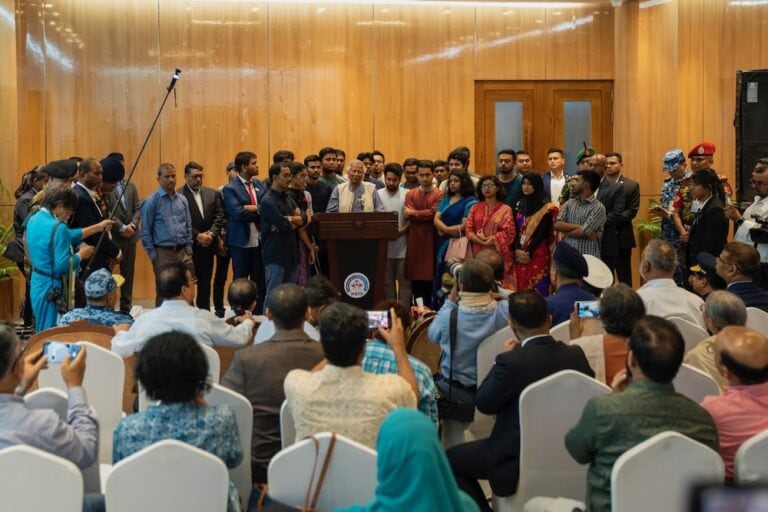(RSF/IFEX) – In a letter to Minister for Information Abdul Moyeen Khan, RSF protested the arrest of journalist Aminul Islam Chowdhury. “The behaviour of the energy minister, who apparently intervened to have the journalist arrested, is unworthy of a democratic government,” stated RSF Secretary-General Robert Ménard. The organisation asked the information minister to consult with […]
(RSF/IFEX) – In a letter to Minister for Information Abdul Moyeen Khan, RSF protested the arrest of journalist Aminul Islam Chowdhury. “The behaviour of the energy minister, who apparently intervened to have the journalist arrested, is unworthy of a democratic government,” stated RSF Secretary-General Robert Ménard. The organisation asked the information minister to consult with his colleagues from the Interior and Justice Ministries so that the journalist can be released on bail as quickly as possible. RSF also requested once again that the charges against journalist and human rights activist Shahriar Kabir be dropped. He is accused of “sedition” (see IFEX alerts of 23 and 4 January 2002).
According to information received by RSF, Chowdhury, a reporter from the daily “Dainik Ittefaq” in Sirajganj (northern Bangladesh), was arrested by police at his home on 30 January 2002. Police officers burst into his home in the middle of the night with an arrest warrant, accusing the journalist of not having paid his electricity bill. Although he protested and showed his receipts for payment to the police, Chowdhury was taken to the Sirajganj police station, where he remained in detention overnight. On 31 January, the journalist appeared before the Pabna Court. His lawyers requested that he be released on bail. Their request was rejected the following day. In September 2001, during the election campaign, the daily “Ittefaq” published articles that displeased Iqbal Hassan Mahmud, the Bangladesh Nationalist Party (BNP) candidate for the constituency, who has since become energy minister. Chowdhury is a veteran of the 1971 War of Independence and the local head of the Committee for the Removal of Collaborators and War Criminals, of which journalist Kabir is chairman.
In its letter to the minister, RSF also called his attention to recent threats and attacks on journalists by BNP activists and leaders.
On 1 January, Deep Azad, office manager of the daily “Dainik Jugantor” in Khulna (southeast Bangladesh), received death threats from BNP activists. A minister condemned these threats and stated that the people who made them were “criminals,” not BNP activists.
On 5 January, Masum Sharif, a journalist from the daily “Dainik Shahnama”, was attacked in Barisal (southern Bangladesh) by Juba Dal (BNP youth) activists. As the journalist was covering a brawl between two groups of young people, involving Juba Dal members in particular, he was assaulted by the party leader’s brother, who, with another man’s help, pushed him aside and beat him.
On 8 January, Tapan Basu, a correspondent for the daily “Dainik Ajker Kagoj” in Agailjhara (close to Barisal), received death threats from armed BNP activists. Minhaj Fakir, a member of the party’s youth wing, was furious about the publication of an article about him, and ordered a manhunt for the journalist, in order to “teach him a lesson.” Basu has since feared for his life and remains locked inside his home.
On 26 January, Sushanta Kanu, a correspondent for the newspaper “Dainik Prothom Alo” in Jamalpur (northern Bangladesh), received death threats from Mahbubur Rahman Ansari, a local BNP leader. At a meeting of the Jamalpur administrative authorities, Deputy Finance Minister Anwaruk Kabir Talukder implied that local journalists were involved in corruption. Kanu, chairman of the city’s press club, was outraged by the deputy minister’s insinuations concerning his colleagues. At the end of the meeting, BNP leaders shouted at the journalist, saying he would “pay with his life” for having insulted the deputy minister. Following the threats, the Jamalpur Press Club demanded excuses from Rahman Ansari. The politician responded by reiterating his death threats and reminding the journalist, who is a Hindu, that he might also become a victim of inter-religion violence (dozens of Hindus have been attacked by members of the Muslim majority in Bangladesh). Kanu has also received dozens of death threats on his mobile phone. Jamalpur’s deputy chief of police has refused to accept the journalist’s complaint against the BNP official.


